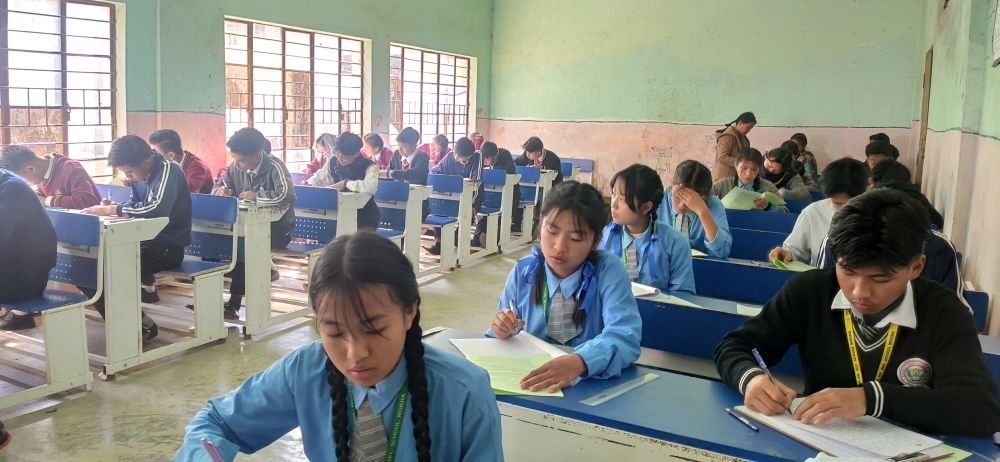
A Dialogue on book by Dr. John Thomas
Morung Express News
Dimapur | October 18
The colonial project among the Nagas is not as old as Naga society itself, yet it has taken over the social, religious, cultural and political imagination of the Naga nation in a way that has produced a disconnect from history, stagnation in ‘form and content’ of the nation and the inability to liberate the Naga ‘self’.
These complex ideas came into thoughtful interplay at a Dialogue with Dr. John Thomas, Assistant Professor at the Department of Humanities and Social Sciences, IIT Guwahati, at DABA’s Elim Hall here today. Jointly organised by the Foundation of Church and Society (Oriental Theological Seminary), Heritage Publishing House and The Morung Express, the Dialogue revolved around the book ‘Evangelising the Nation: Religion and the Formation of Naga Political Identity’ (Routledge 2016) written by Dr. John Thomas.
In his book, Dr. Thomas primarily examines “the extent to which a religion armed with universal truth claims, assumptions and agencies mediated the formation of a modern political identity among Nagas,” and traverses the history of “more than a hundred years in the life of a people.” How did the Naga people transition from pre-colonial communal ethos, or religion as an “everyday reality,” to Christian individualism and modernity?
In an era when “historical amnesia” reigns, Dr. Thomas attempted to understand what happens when a rich social and cultural history is overshadowed by the State and Christian missionary’s history of “savagery” and “darkness”—the continued colonial erasure of a culturally valuable pre colonial past informed the formation of Naga religious identity which eventually informed the “form and content” of the Naga political identity, according to him, creating confusion and contradiction.
However, “the hegemonic approach or grand narratives of colonial power played to our advantage, lifting us from our primordial context towards a linear view of history moving toward new possibilities,” said Dr. Wati Aier, Principal of the OTS, while responding to Dr. Thomas at the Dialogue. While a “theological paradigm informed by colonialism” did shape “form and content” of the Naga nation, that has led to considerable ideological stagnation today, contemporary Naga theology is continually being re-defined by the hermeneutics of looking forward, thereby also looking to re-shape the Naga political identity.
Dr. Melvil Pereira, Director at the North Eastern Social Research Centre, in another response to the Dialogue brought forward the nuanced research that Dr. Thomas had done to bring out this book, which is a revised version of his PhD thesis (completed at Jawaharlal Nehru University). “The Church’s intervention tamed the Raging Mithun,” noted Dr. Pereira, while referring to parts of the book where the development of Naga political identity is discussed in its intersection with American Baptist missionising. CLICK HERE
Britishers, Bombs, Baptists and a Book: A Review of Evangelising the Nation by John Thomas
A public discussion followed on how this happened, the routes it took, how people participated in it and ways to carve a future from an ever transforming paradigm controlled by the Naga people instead of an outside force. But to take control of defining the Naga ‘self’, it is of primary importance to “liberate” the self.
“Our cultural, social, religious or political selves are put into praxis through a public character called the Naga. Sometimes this leads to contradictions but sometimes it reaffirms who we are,” contemplated Dr. Aküm Longchari, Editor of The Morung Express, in his concluding remarks to the discussion. As the reins of control have slipped from Naga hands, the right to self-definition has been denied, which has caused too much concentration on form, thereby weakening of content.
“We have to critically analyse the colonial era to examine the source of our predicament,” he said, noting that Dr. Thomas’ book is “asking us to liberate the political, social and cultural self,” such that a Naga theology, state or culture may arise as an inevitable consequence. To liberate, for Longchari, would mean that dialogue becomes the form and values of humanisation the content.
(The book is currently available on Flipkart and Amazon. The South Asia Edition costs Rs. 895)


.jpg)
.jpg)
.jpg)
